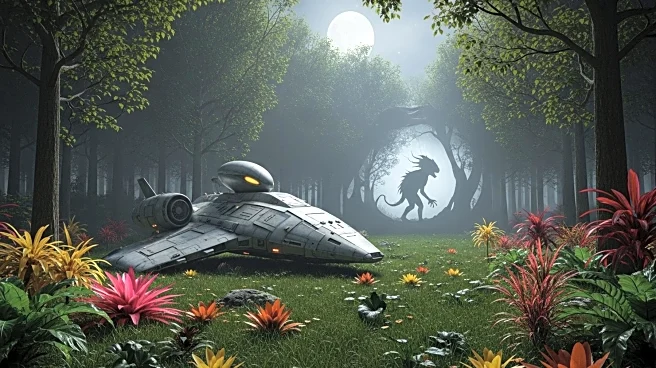What's Happening?
Alien: Earth has premiered its first episode titled 'Neverland,' introducing Sydney Chandler as the 'Hybrid' Wendy. The episode, written and directed by Noah Hawley, begins with the crash of the USCSS Maginot spaceship in Prodigy City, leading to a sister's search for her brother amidst an alien threat. The storyline unfolds in 2120, with the Weyland-Yutani ship returning from a deep space mission carrying extraterrestrial specimens. A catastrophic containment breach results in the ship crashing into Earth, setting off a series of events involving the creation of human-robot hybrids on Prodigy Island.
Why It's Important?
The premiere of Alien: Earth marks a significant addition to the science fiction genre, exploring themes of human immortality and advanced technology. The series delves into ethical and scientific questions surrounding the creation of hybrids, potentially influencing public discourse on the future of human enhancement and artificial intelligence. The show's narrative, combining elements of space exploration and alien encounters, may attract a diverse audience interested in speculative fiction, thereby impacting viewership trends and content creation in the sci-fi domain.
What's Next?
As the series progresses, viewers can expect further exploration of the hybrid creation process and its implications. The storyline may delve deeper into the ethical dilemmas faced by characters, particularly regarding the use of technology for human enhancement. The show's creators might introduce new characters and plot twists, expanding the narrative universe. Audience reactions and feedback will likely shape the direction of future episodes, influencing potential spin-offs or related projects.
Beyond the Headlines
Alien: Earth raises questions about the intersection of technology and humanity, prompting discussions on the moral implications of creating hybrids. The series may contribute to broader debates on the role of technology in society, particularly concerning identity and the definition of humanity. Long-term, the show could inspire real-world scientific exploration and innovation, as it challenges viewers to consider the possibilities and consequences of advanced technological developments.










